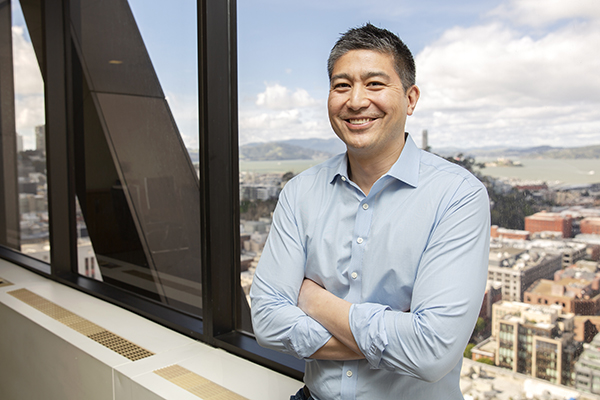The partner who runs the software practice at Qatalyst Partners talks about the rigors of investment banking and his road from a political science major to an MBA from the Evening & Weekend program to his role as an M&A advisor at a boutique firm.
You earned a political science degree from UCLA and worked in marketing before enrolling at Berkeley Haas. How did you finally arrive at investment banking?
I wish I could say it was premeditated, but it wasn’t. It was much more ad hoc and spontaneous. My dad had always wanted me to go to business school, but it was never a focus for me during my 20s. When I applied, I didn’t imagine that I would focus on finance let alone become an investment banker. I didn’t really know what investment banking was! Haas showed me a range of possibilities I didn’t know existed. It was applying for a summer internship in banking at Goldman Sachs that really put my brain in overdrive.
I didn’t have a quantitative analytical background but while I was interviewing on campus, the representative from Goldman told me, ‘I’m going to take a chance on you. Even though you may not be the best associate, you may have the potential to be a good senior banker.’ He said he knew the first few years would be hard for me as I brushed up on my quantitative skills, but he thought I had the personality and the natural EQ [emotional intelligence] to succeed at a senior level, if I got that far.
How was that summer internship?
It was the hardest 10 weeks of my life! I was determined to demonstrate that I could handle the rigors of the job. I was often in the office until 3 in the morning as the pace and cadence of work, the long hours, and working in Excel were really new to me. It was a very painful summer. I was so lost at times.
What is the most practical thing you learned at Berkeley Haas?
It’s not one single thing. The Berkeley MBA education is incredibly well-rounded. Of course it grounded me in finance and accounting, and the electives were equally important. It also helped me look at business through a variety of lenses.
And it’s not just what you learn, it’s also the people you meet from different backgrounds and different businesses. That diversity adds to the fabric of the experience, it fills in the blanks.
What are the rewards of investment banking?
It’s been an interesting run and most importantly, it’s been fun. This is an amazing time in technology. There are so many disruptive and innovative technologies: cloud computing, AI, autonomous vehicles. At Qatalyst, we have had the good fortune to work on many interesting, challenging, and impactful transactions. The stakes are very high. If you make one bad decision or miss one trend, it could be disastrous. Think about Nokia or BlackBerry: They had massive leads in their category over competitors like Apple and it was reflected in their market cap. But they missed one very important product -- the smartphone.
How do you sleep at night?
Not very well! At the associate level, your job is to get work done and get it done correctly while juggling many assignments. You have to be prepared for 100-hour weeks. I don’t want to sugarcoat it. There are significant personal sacrifices.
As you get more senior it’s less the stress of long hours and more the stress of thinking about what value you are able to provide for your clients. The goal is to be a trusted advisor and to help your clients think through their most important and difficult decisions. Often, it’s being the industry expert who understands the next moves on the strategic chessboard.
What is your strongest skill or attribute as a leader?
Generally speaking, I think finance professionals excel in managing process. I am not a finance lifer. Coming from a marketing background I brought a different perspective on how to lead and manage. For me, managing people is the key. There are social and emotional aspects to managing people. It’s about giving your teammates opportunities they might not otherwise have to punch above their weight. It’s about factoring in all of the team members’ opinions including the most junior team members, investing in their careers, getting their feedback. In my opinion, the best managers are the best listeners.
What about managing clients?
Working with clients is my favorite part of the job. Helping them think through important decisions is a privilege we do not take lightly. In addition to dealing with the strategic and tactical elements of a potential transaction, we have to remember that these transactions are also emotional for the principals. An overlooked part of an advisor’s role is to listen and understand how the client is both thinking and feeling. In some ways, our job is similar to being a psychiatrist; you need to listen and be aware of your client’s mindset.
You’ve worked at a major firm, Goldman Sachs, then at a boutique firm, Qatalyst. What are the tradeoffs?
At Goldman Sachs, I worked on IPOs, M&A, various debt offerings, and was exposed to every financial product. It was then that I decided to focus on M&A advisory. It was a great learning experience and provided me with a great foundation.
At a big firm, you are working across hundreds or thousands of people. At Qatalyst, we aren’t spread across the globe. I get to see everyone every day: I’m enjoying the more focused and personal experience at a boutique firm.
Growing up, did you have a source of inspiration that may have led you to where you are now?
My parents were my role models and I aspired to make them proud. They were college educated but when they emigrated from Taiwan my father had to work as busboy in a Chinese restaurant. Eventually he owned a restaurant supply business focused on exporting to Asia and got an MBA from Golden Gate University. My mom took BART every morning from the East Bay to work at China Airlines in San Francisco. Watching my parents work tirelessly around the clock made me work harder in school. It really was the classic immigrant family story of chasing the American Dream.




